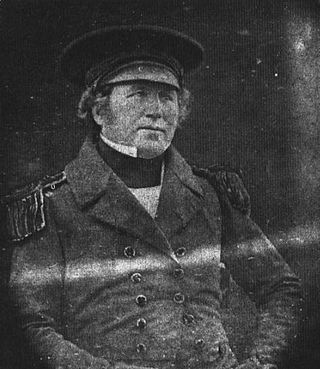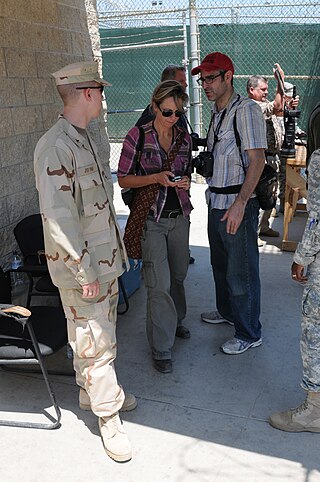Related Research Articles

The Pulitzer Prize for Breaking News Photography is one of the American Pulitzer Prizes annually awarded for journalism. From 2000 it has used the "breaking news" name but it is considered a continuation of the Pulitzer Prize for Spot News Photography, which was awarded from 1968 to 1999. Prior to 1968, a single Prize was awarded for photojournalism, the Pulitzer Prize for Photography, which was replaced in that year by Pulitzer Prize for Spot News Photography and Pulitzer Prize for Feature Photography.

Sir John Franklin was a British Royal Navy officer and Arctic explorer. After serving in wars against Napoleonic France and the United States, he led two expeditions into the Canadian Arctic and through the islands of the Arctic Archipelago, in 1819 and 1825, and served as Lieutenant-Governor of Van Diemen's Land from 1839 to 1843. During his third and final expedition, an attempt to traverse the Northwest Passage in 1845, Franklin's ships became icebound off King William Island in what is now Nunavut, where he died in June 1847. The icebound ships were abandoned ten months later and the entire crew died, from causes such as starvation, hypothermia, and scurvy.

HMS Erebus was a Hecla-class bomb vessel constructed by the Royal Navy in Pembroke dockyard, Wales, in 1826. The vessel was the second in the Royal Navy named after Erebus, the personification of darkness in Greek mythology.
Robert Lorne Hunter was a Canadian environmentalist, journalist, author and politician. He was a member of the Don't Make a Wave Committee in 1969, and a co-founder of Greenpeace in 1971 and its first president. He led the first on-sea anti-whaling campaigns in the world, against Russian and Australian whalers, which helped lead to the ban on commercial whaling. He campaigned against nuclear testing, the Canadian seal hunt and later, climate change with his book Thermageddon: Countdown to 2030. He was named by Time as one of the "Eco-Heroes" of the 20th century.

HMS Terror was a specialised warship and a newly developed bomb vessel constructed for the Royal Navy in 1813. She participated in several battles of the War of 1812, including the Battle of Baltimore with the bombardment of Fort McHenry. She was converted into a polar exploration ship two decades later, and participated in George Back's Arctic expedition of 1836–1837, the successful Ross expedition to the Antarctic of 1839 to 1843, and Sir John Franklin's ill-fated attempt to force the Northwest Passage in 1845, during which she was lost with all hands along with HMS Erebus.
The following are the Pulitzer Prizes for 1994.

Steve Coll is an American journalist, academic, and executive.
The Pulitzer Prizes for 1981 were announced on April 13, 1981.

Francis Rawdon Moira Crozier was an Irish officer of the Royal Navy and polar explorer who participated in six expeditions to the Arctic and Antarctic. In May 1845, he was second-in-command to Sir John Franklin and captain of HMS Terror during the Franklin expedition to discover the Northwest Passage, which ended with the loss of all 129 crewmen in mysterious circumstances.

David Allison Fraser is a retired Canadian Forces officer who served as a major-general in Land Force Command. The country’s first general officer to command American troops in combat since the Second World War, Fraser's most noteworthy role was as brigadier-general during Operation Medusa, which took place in Afghanistan from September 1–17, 2006 as part of NATO’s coalition efforts in the region.
Brian Edward Stewart, is a Canadian journalist. Stewart is best known for his news reports and documentary features as senior correspondent of the Canadian Broadcasting Corporation's (CBC) flagship news hour, The National, where he worked for over two decades.

Sir James Clark Ross was a British Royal Navy officer and polar explorer known for his explorations of the Arctic, participating in two expeditions led by his uncle John Ross, and four led by William Edward Parry, and, in particular, for his own Antarctic expedition from 1839 to 1843.

Franklin's lost expedition was a failed British voyage of Arctic exploration led by Captain Sir John Franklin that departed England in 1845 aboard two ships, HMS Erebus and HMS Terror, and was assigned to traverse the last unnavigated sections of the Northwest Passage in the Canadian Arctic and to record magnetic data to help determine whether a better understanding could aid navigation. The expedition met with disaster after both ships and their crews, a total of 129 officers and men, became icebound in Victoria Strait near King William Island in what is today the Canadian territory of Nunavut. After being icebound for more than a year Erebus and Terror were abandoned in April 1848, by which point two dozen men, including Franklin, had died. The survivors, now led by Franklin's second-in-command, Francis Crozier, and Erebus's captain, James Fitzjames, set out for the Canadian mainland and disappeared, presumably having perished.
John Grigsby Geiger is an American-born Canadian author. He is best known for his book The Third Man Factor: Surviving the Impossible, which popularized the concept of the "third man", an incorporeal being that aids people under extreme duress. The book is the basis for a National Geographic Channel video entitled Explorer: The Angel Effect, in which Geiger appears. In turn, a second book on the topic, based on, and taking its name from the National Geographic video, was published in 2013. His other works include the international bestseller Frozen in Time: The Fate of the Franklin Expedition. In 2013, Geiger was appointed Chief Executive Officer of the Royal Canadian Geographical Society.

David Bowne Wood is a journalist who has reported on war and conflict around the world for 35 years. He won the 2012 Pulitzer Prize for National Reporting, for a series on the American troops severely wounded in Iraq and Afghanistan. A birthright Quaker, Wood registered as a conscientious objector in 1963 and served two years of civilian service before becoming a journalist.

Louie Palu is a Canadian documentary photographer and filmmaker known for covering social-political issues, including war and human rights. His first major body of work was Cage Call: Life and Death in the Hard Rock Mining Belt with writer Charlie Angus, followed by working for The Globe and Mail for 6 years as a staff photographer (2001–2007). In addition to this, he covered the war in Kandahar, Afghanistan, between 2006 and 2010 and the drug war on the U.S.-Mexico border between 2011 and 2012.

Barbara Davidson is a Pulitzer Prize and Emmy award winning photojournalist. She is currently a Guggenheim Fellow, 2019-2020, and is travelling the country in her car, with her two dogs, making 8x10 portraits of gun-shot survivors using an 8x10 film camera.
Marc-André Bernier is a Canadian archaeologist who specializes in underwater archaeology. Described as the "Indiana Jones of the deep seas" by the Toronto Star, Bernier was born in Kapuskasing, Ontario, and educated at the University of Ottawa, from which he received a BA degree in Classical Studies and a MA degree in Greek Archaeology. He also received an Education degree from Université du Québec en Abitibi-Témiscamingue. He joined the Underwater Archaeology Team of Parks Canada in 1990 and, in 2008, became its manager. He retired from Parks Canada in 2022.

James Walter Fairholme was a British Royal Navy officer and polar explorer who in 1845 served under Sir John Franklin on the Erebus during the Franklin expedition to discover the Northwest Passage, which ended with the loss of all 129 crewmen in mysterious circumstances.
Eternity Martis is a Canadian journalist and author from Toronto, Ontario. Her debut publication They Said This Would Be Fun: Race, Campus Life, and Growing up won the 2021 Kobo Emerging Writer Prize for non-fiction.
References
- ↑ Paul Watson, Where War Lives, (Toronto: McLelland & Stewart, 2007), Jacket
- ↑ Paul Watson, Where War Lives, (Toronto: McLelland & Stewart, 2007), p.190
- ↑ Watson, Paul (2007). Where War Lives . McClelland & Stewart Ltd. ISBN 978-0-7710-8822-3.
- ↑ "The haunting of Paul Watson". 2007-08-19. Archived from the original on 2009-12-30. Retrieved 2008-11-01.
- ↑ "Where War Lives". Paul Watson. Archived from the original on 2008-12-05. Retrieved 2008-11-01.
- ↑ Gardner, Lyn (January 26, 2014). "The Body of an American – review". The Guardian. Retrieved January 28, 2019.
- ↑ McGuinness, Patrick (November 15, 2013). "War Reporter by Dan O'Brien – review". The Guardian. Retrieved January 28, 2019.
- ↑ Watson, Paul (September 14, 2015). "The Wreck Of HMS Erebus: How A Landmark Discovery Triggered A Fight For Canada's History". Buzzfeed. Retrieved January 28, 2019.
- ↑ McGoogan, Ken (March 17, 2017). "Paul Watson's Ice Ghosts and Ed O'Loughlin's Minds of Winter, reviewed: Searching for Franklin". The Globe and Mail. Retrieved January 28, 2019.
- ↑ McKie, Robin (May 7, 2017). "Ice Ghosts: The Epic Hunt for the Lost Franklin Expedition by Paul Watson – review". The Guardian. Retrieved January 28, 2017.